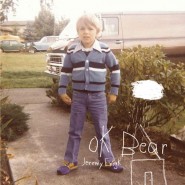 Jeremy Enigk
Jeremy EnigkOK Bear
Score: 34
Jeremy Enigk has been part of three bands up until now, including The Fire Theft and the more well-known Sunny Day Real Estate, often cited as a influence on modern pop-punk music. OK Bear is his third solo full-length, and it displays influence from each of the groups he’s worked with. Though the album itself is disappointing, the saddest part is that he doesn’t put this influence to good use.
OK Bear contains many interesting instrumental lines, including countermelodic guitar strings and innovative bass lines. One might wonder then why OK Bear does not deserve a significantly higher score. The problem is that while these lines do exist, many tracks do not have these elements, becoming soporifically dull, and even when the lines do appear, they never quite mesh together. Regardless of how interesting the individual lines are, the tracks begin to sound like large messes. In fact, the only track where all the instruments really come together is “Sandwich Time,” where the unexpected chord progressions, especially in the second section of the track, which starts near the 1:30 mark, and intertwining of guitar, keyboard, and brass, works remarkably well. Of course, this track is still held back by Enigk’s uncompelling voice and the less-than-amazing lyrics suggested by the track’s title.
Enigk’s rather dry, sharp vocals manifest themselves about three seconds into OK Bear, and it’s not an especially welcome appearance. His insistence on stretching his voice as far as possible leads it to seem constantly strained, giving the entire album an irritatingly overdone cast. On certain tracks, such as the less-than-radiant “Life’s Too Short,” and “Vale Oso,” this effect becomes irksome as it climbs to even greater prominence. Further undermined by the odd sounds interspersed with the album, Enigk’s vocals are alternately tiresome and impenetrable, and always meandering.
OK Bear’s lyrics are clearly trying to be deep, and they clearly fail. Enigk has filled the album with odd phrases like “late of camera,” and the confusion these engender doesn’t help to mitigate the vocal issues. However, it’s probably a better reflection on the album that such a simple, rather generic phrase as “just a state of mind” can be so unpleasant to listen to - and when that’s both a track title and a line repeated through the track itself, it doesn’t bode well. Enigk may seem to enjoy singing about the “magic world” and the “marketplace,” but it’s hard to empathize with or enjoy his lyrical constructs.
With instrumentals, lyrics, and vocals that are all suboptimal, OK Bear cannot be expected to piece together well - and it doesn’t. The messy conglomeration of guitar, bass, drums, and keyboard that pervades many of the tracks extends to vocals as well. Mixing is often done oddly, with what might seem to be the most interesting or important line being held back by a lack of volume. Lastly, the album is so frequently slow that it never gets active enough, as suggested by the drums that seem to yearn for a faster tempo in “Mind Ideas,” to support itself.
OK Bear is not Enigk’s strongest album; in fact, it turns out to be a slight disaster. Enigk’s vocals sound, especially nearing the end of the album, more obnoxious or annoying than intriguing, the lyrics follow suit, and the rest of the album never comes together enough to rescue the botched singing effort, or even forgive it to some degree. As a result the album leaves you with the impression that even with all his experience, Jeremy Enigk did not quite know what he was doing.
This post is tagged 30-39, Jeremy Enigk